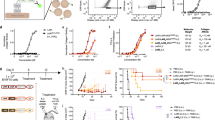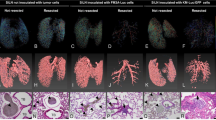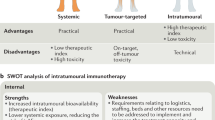Abstract
The investigations reported in this paper aim to exploit tumour necrosis factor (TNF)-induced vascular changes in an attempt to increase the tumour uptake of specific monoclonal antibody. The vascular permeability to monoclonal antibody of a human tumour xenograft increased 2.6-fold by 1 h post injection of 2.5 x 10(3) U of TNF, although this effect was lost by 3 h. The normal tissues also demonstrated increased vascular permeability to IgG, but to a lesser extent. Liver permeability increased 1.5-fold at 1 h but returned to the control value by 6 h. Lung permeability increased 1.4-fold at 1 h post injection and returned to normal by 3 h. Muscle values were not significantly increased compared with controls. The blood activity was cleared more quickly in the TNF-treated mice (t1/2 beta = 101 h, compared with 121 h in control mice). This was probably due to the increased vascular permeability in normal organs of treated mice. At 1 day and 3 days post injection, the tumour uptake of the specific, but not the control, antibody was significantly increased by 25% and 29% respectively. This resulted in an increase in the area under the tumour activity curve, and therefore tumour radiation dose, of 25% in treated compared with control mice. In addition, a consequence of the faster blood clearance of the isotope in the TNF-treated mice was a reduction in the area under the blood activity curve of 12%, thereby reducing systemic toxicity. The increase in vascular permeability to IgG following TNF injection resulted in both specific and control antibodies having improved access to the tumour antigens, and a transient increase in uptake was observed. Only in the case of the specific antibody was the increase maintained, since this antibody binds to the available antigenic sites, whereas the control antibody was cleared from the tumour without binding. No evidence of tumour necrosis was observed at the TNF doses given, nor was there any toxicity to the mice.
This is a preview of subscription content, access via your institution
Access options
Subscribe to this journal
Receive 24 print issues and online access
$259.00 per year
only $10.79 per issue
Buy this article
- Purchase on Springer Link
- Instant access to full article PDF
Prices may be subject to local taxes which are calculated during checkout
Similar content being viewed by others
Author information
Authors and Affiliations
Rights and permissions
About this article
Cite this article
Rowlinson-Busza, G., Maraveyas, A. & Epenetos, A. Effect of tumour necrosis factor on the uptake of specific and control monoclonal antibodies in a human tumour xenograft model. Br J Cancer 71, 660–665 (1995). https://doi.org/10.1038/bjc.1995.131
Issue Date:
DOI: https://doi.org/10.1038/bjc.1995.131
This article is cited by
-
Application of PBPK modeling to predict monoclonal antibody disposition in plasma and tissues in mouse models of human colorectal cancer
Journal of Pharmacokinetics and Pharmacodynamics (2012)
-
Pharmacokinetics of Monoclonal Antibodies
Clinical Immunotherapeutics (1996)



